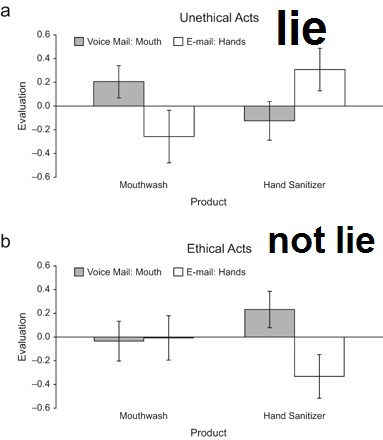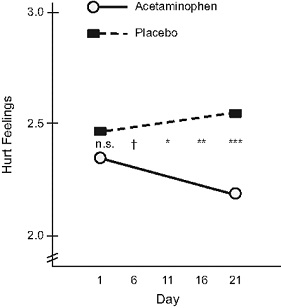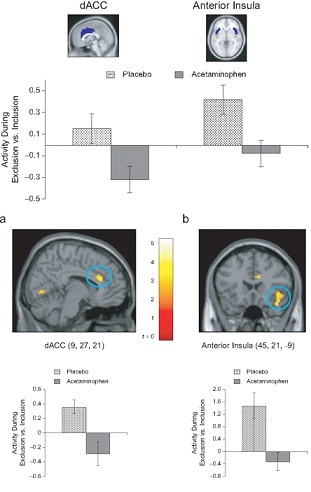October 22, 2010
Language And Behavior, Embodiement, and Chronic Pain

apparently, effective
Fast food makes you... faster?
57 college brats watched images flash for 12ms on a screen. That is too fast to consciously perceive. One group saw colored squares, the other saw fast food logos.
Then they read a passage. The control group read it in 84 seconds, the fast food group read it in 69.
Repeat: 12ms is too fast to consciously appreciate.
II. The embodiement of lying
87 college kids were asked to either tell the truth, or lie, in one of two formats: a voice mail message or an email. They actually performed the message.
Then they were asked to rate the desirability of some products, including mouthwash and hand sanitizer.

When they lied with their mouth, they preferred mouthwash. When they lied with their fingers, they preferred hand sanitizer. When they told the truth with their fingers, they didn't want hand sanitizer. They were already clean.
III. Tylenol reduces psychic pain
62 college kids took 500mg Tylenol BID, or placebo, for 3 weeks. Every day they completed the "Hurt Feelings Scale" (e,g, "today being teased hurt my feelings.")

Tylenol users felt less psychological pain. However you want to explain this,

it is evident that being on Tylenol made the brain work differently.
IV. Locking up negative thoughts
80 college students were asked to write about a recent decision they regretted. Half were asked to seal their answer in an envelope and turn it in, the others just turned it in.
Those that sealed their answers reported feeling less upset, less negative than those that didn't. The obvious but easily overlooked point is that the subjects didn't seal their answers in order to gain closure; the increased closure was the "accidental" consequence of a physical behavior. This physical action produces a psychological analogue because Freud was right: the unconscious operates like a rebus. The act is read by the unconscious in its own way, abstractly, semantically.
V.
The point of all of this is not to suggest that we are desparately out of touch with our bodies, purposely disconnected, unwilling to accept that its flaws and strengths are intimately tied to our personalities and behavior, though this isn't such a bad thing to suggest. The mind/body problem hasn't been solved not because it is philosophically or scientifically insoluble, but because it is a psychological defense. You may be able to circumvent Darwin but you can't beat Freud.
Consider someone with somatoform disorder, who has physically manifested some psychological pain. You can't logic this away, you can't show them normal MRIs and blood tests as evidence that it's psychological, because they're not operating on a logic level, they're not even operating on a verbal level. The ability to manifest the pain physically instead of psychologically means this is a more basic, unconscious maneuver. So it's not that they don't believe the MRI is normal, they are fully convinced of it; but they're not making a distinction between mind and body the way you are.
An analogy would be your computer crashes. So? You may be able to identify some of the internal parts and you know what Windows "is" but you have no idea how they work together, what affects what. So you say, "my computer won't start" and the IT guy is frustrated, "you mean there's no power, or there's power but Windows doesn't load, or...?"
The fact that your brain made your lower back hurt is not qualitatively different than the fact that a tiger made your back hurt. The fact that Prozac makes your back feel better doesn't mean it wasn't "really" your back.
Some of you will recoil from this thinking, and you're the same people who ask if there's no power or Windows itself won't boot up. I sympathize, but you can't talk his way out of this.
Behavior got you into this mess, and behavior will get you out. The more words you use to explain/encourage/dissect/intimate the more the behaviors or symptoms dig in. Words are perceived as a trick, like a kid suspicious of mom talking up broccoli. The pain is there for a reason, and you're trying to fool away the pain without taking away the reason.
VI.
The solution to managing this kind of mysterious chronic pain is to not manage the pain, but the behaviors. The problem of physically manifested psychic pain is the problem of learned helplessness, which means the longer you suffer like this, the more likely you are to give up trying not to suffer like this.
Like a POW, you can't tough your way through the pain, it will outlast you. You can't trade short term benefit for long term set back because again, it will outlast you.
This kind of pain I am talking about-- crippling, debilitating, and infuriating to everyone else is more about the consequences of the pain than the pain itself. You may actually have been injured by a tiger, but what has paralyzed you now is your brain wondering:
- what's going to happen to me?
- This will never get better.
- My husband will leave me because of this.
- I will never be able to work because of this.
and a bunch of what ifs/if only:
- if only I hadn't fed that tiger
- if only I had iced it sooner
- if only I could do it all over again I'd--
- what if this is a sign of something worse?
That's the part of the pain that is crippling. Anyone can tolerate any kind of pain as long as they know there's an end in sight or that it doesn't prevent you from being yourself.
So you have to find a way to make your body do the things that are you:
- "I will never work again"---> what kind of job could I do?
- "it hurts much worse today"--> acknowledge the days when it hurts less
- "my husband will leave me"---> maybe this is a good opportunity to try a menage
and stop planning things which are impossible, in the future, or delay tactics
- "I wish I hadn't fought that tiger"
- "I'll rest it for 6 weeks, then..."
- "I'll order aquatherapy, then..."
All that matters is what you are going to do today. Do something.
---
http://twitter.com/thelastpsych
21 Comments